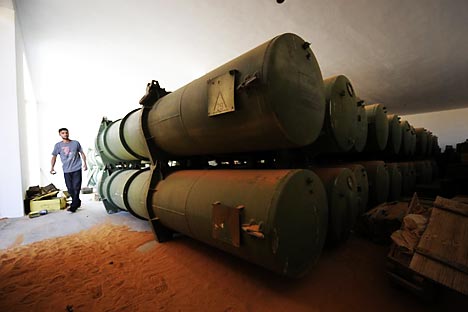Syrian conflict enters a new phase: stagnation

The debates over Syria's chemical weapons indicate that the conflict will not come to an end in the near future. Source: AFP / East News
The Syrian crisis is entering a new phase. The Free Syrian Army (FSA), which is spearheading the armed opposition, has announced it is adopting guerilla tactics, indicating that the war is likely to continue for the foreseeable future with no clear victory on either side.
“The Free Syrian Army is carrying out a war of harassing the regime army until it is exhausted, using guerrilla tactics,” FSA spokesman Malik Kurdy told the Washington Post on Tuesday. “We cannot say the Free Syrian Army is in complete control, and we cannot say the regime army is in complete control, and this will stay the same until the Free Syrian Army gets heavy weapons and there are more defections.”
Related:
Moscow condemns Syrian threat to use chemical weapons
Russia and Italy discussed the Syrian issue
It is by no means certain that the Assad regime will be able to crush the armed opposition, but the FSA will not be getting heavy weaponry for the time being. The Obama Administration has said it will increase aid to the opposition by providing communications equipment and sharing reconnaissance data, but they have not agreed to supply weapons.
In the last few days, Israel has been showing growing concern that Syria’s chemical weapons might fall into the hands of Islamic militants, particularly Hezbollah. Israeli Prime Minister Benjamin Netanyahu said in an interview with the Fox News channel that he was afraid that, after the fall of the Syrian regime, chaos would break out in the country and, in this situation, terrorists might gain access to chemical weapons. “We certainly don’t want to be exposed to chemical weapons falling into the hands of Hezbollah or some other terrorist group,” Netanyahu said. Israeli Defense Minister Ehud Barak earlier said that Israel was considering military action if there is a danger terrorists will get hold of chemical weapons.
Obama press secretary Jay Carney tried to allay journalists’ fears: “We believe that Syria's chemical weapons remain under Syrian government control. But given the escalation in violence, and the regime's increasing attacks on its own people, we remain very concerned about these weapons,” he said.
Israeli Foreign Minister Avigdor Liberan told a press conference in Brussels: “in the moment we see that the Syrians transfer chemical and biological weapons to Hezbollah, this is a red line for us. Such a move would be a ‘casus belli.’”
Syria is still technically in a state of armistice with Israel and has maintained a contingent of troops on the Golan Heights as part of the settlement. Now many of these troops must be removed to fight the insurgency. Israel’s tough talk gave Damascus enough cause for concern that it issued a statement declaring that chemical weapons might be used in response to any foreign aggression. A day later, outcries from the U.S. in and Western European countries resulted in the statement being withdrawn. Nevertheless, the discussion over chemical weapons remains in the media.
Using chemical weapons against the rebels is the surest way for the regime to isolate itself from the world. Moscow military expert Valentin Yurchenko is quoted by Interfax as saying that use of chemical weapons against the military opposition is highly unlikely because “such a step would inevitably entail foreign military interference.” Indeed, in his opinion, “the Syrian military may be in contact with the Americans over the safety of these stockpiles – both sides feel more comfortable that way.” The expert also recalled that the Americans had calculated in February that should the regime of Bashar Assad fall, a 75,000-strong army would be needed to guard the Syrian chemical stockpiles.
According to a Russian expert on weapons of mass destruction, who preferred to remain anonymous, Syria seems to possess binary weapons with the components stored. An attack on one of the storage facilities would not give the attacking forces access to the weapons.
At the same time, “the playing up of the Syrian chemical weapons theme shows that it can be used as a pretext for intervention,” the expert said. “Chemical weapons stir up public opinion. Against the background of the civil war, a move may be made to put the weapons under the control of international forces, including under a UN mandate. Even so, such permission from the UN cannot be obtained without Russia’s consent. Without it, seizure of Syrian chemical weapons would be a prologue to a major upheaval in the Middle East.”
All rights reserved by Rossiyskaya Gazeta.
Subscribe
to our newsletter!
Get the week's best stories straight to your inbox